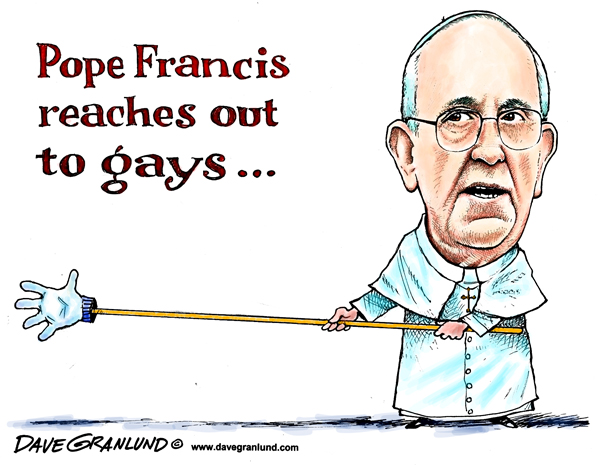Glendora Catholic school dismisses gay Rancho Cucamonga teacher after publicized wedding
By Melissa Pinion-Whitt,
A Rancho Cucamonga man who taught 17 years at a Catholic high school was fired from his job days after he married his gay partner in a San Bernardino civil ceremony.
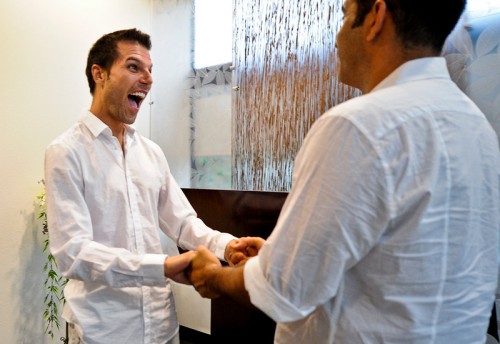 While school representatives declined comment on the matter, an attorney representing 45-year-old Ken Bencomo says he was fired because of the same-sex ceremony.
While school representatives declined comment on the matter, an attorney representing 45-year-old Ken Bencomo says he was fired because of the same-sex ceremony.
“The reason given was that the marriage occurred and the school’s position was that it violated church teachings,” said Chatsworth attorney Patrick McGarrigle.
Bencomo, 45, was head of the English department at St. Lucy’s Priory High School in Glendora, but also worked as a yearbook moderator and dance coach.
Students say they were aware of Bencomo’s sexual orientation.
“He never talked about his personal life to his students, but it’s something that students and faculty knew,” said former student, Abigail O’Brien, 19, of Upland.
McGarrigle also said the school was aware long before he got married.
“St. Lucy’s has known of Mr. Bencomo’s orientation for years,” she said. “Administrators had been introduced to his partner in the past, so the suggestion that Ken’s orientation is a surprise or that his lifestyle somehow violated doctrine is at odds with the school’s knowledge and what seemed to be acceptance of him until most recently.”
In an online petition protesting Bencomo’s termination, supporters of the former teacher say a July 2 article in the Daily Bulletin prompted the school to dismiss him. Bencomo
and his husband, Christopher Persky, 32, of Rancho Cucamonga were one of the first gay couples to line up at the San Bernardino County Assessor-Recorder’s Office to get married July 1 following a Supreme Court decision allowing same-sex marriage.
He appeared in photographs and video for the story.
Sister Helen Dziuk, assistant principal at St. Lucy’s, declined comment and referred inquiries to the school’s attorney, Joseph Stark.
St. Lucy’s officials later issued a written statement, saying the school plans to continue educating students “in the tradition of the Catholic faith.”
“As a Benedictine school, St. Lucy’s is a community for those who wish to express Christian values in education and develop person and academic excellence,” the statement said.
Stark said an attorney representing Bencomo contacted the school on Sunday, but declined to elaborate.
“I have yet to see what his allegations are, so I can’t comment,” he said.
While about 2,000 people had signed the petition by Wednesday and more than 1,300 had joined a Facebook discussion group about Bencomo, not everyone felt the school’s decision was wrong.
James Wellman, a former board and executive committee member for the school, said he thought Bencomo might still be teaching at St. Lucy’s had he not appeared in the newspaper.
“We should not forget that Ken has been teaching at a Catholic high school. Anyone who believes that St. Lucy’s operates in a totally independent fashion from the Catholic Church is gravely mistaken,” he said.
The Diocese of San Bernardino said its Catholic schools prohibit discrimination against teachers or other school employees based on their lifestyle choices.
“However, if a teacher or school employee makes a public display of behavior that is counter to church teaching – such as homosexuality, sex outside of marriage, having a child outside of marriage – that can impact their employment status,” said John Andrews, diocese spokesman.
School policies outlined by the Archdiocese of Los Angeles say a staff member can be counseled or disciplined if he or she engages in “behavior counter to the moral teachings and standards of the church.”
Former St. Lucy’s student, Brittany Littleton, said policies regarding staff at Catholic schools need to change.
“I am joined by many students and alumni in saying that we believe this is a fight for love and equality, and as such we wish to display love and kindness, even while feeling hurt and shock,” the Beverly Hills woman said.
McGarrigle said Bencomo is hoping to resolve issues with the school without pursuing legal action.
Complete Article HERE!
Pope’s bank clean-up man ‘found stuck in lift with rent boy’
As the man charged with cleaning out the stables at the scandal-struck Vatican bank, Monsignor Battista Ricca will need Machiavellian cunning, good fortune and a whiter-than-white record to have even a fighting chance.
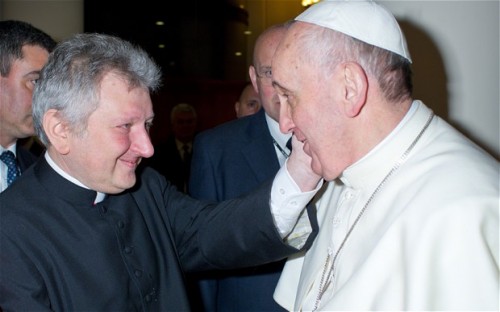 But Pope Francis’s new banker appears to possess none of these attributes after it was reported yesterday that he was found stuck in a lift with a rent boy. Msgr Ricca, as Francis’s new primate with responsibility for the troubled financial institution, known officially as the IoR (Institute for Religious Works), is supposed to usher in new transparency and badly needed reforms after years of financial scandal.
But Pope Francis’s new banker appears to possess none of these attributes after it was reported yesterday that he was found stuck in a lift with a rent boy. Msgr Ricca, as Francis’s new primate with responsibility for the troubled financial institution, known officially as the IoR (Institute for Religious Works), is supposed to usher in new transparency and badly needed reforms after years of financial scandal.
Earlier this month, a major report from finance police and magistrates warned that a lack of checks and controls by the IoR and the Italian financial institutions it had dealings with made the Vatican’s bank a money-laundering hot spot.
It is claimed that Msgr Ricca, 57, impressed Francis with the way he ran three key residences used by cardinals, bishops and priests visiting Rome. But detailed claims have emerged detailing how in 1999, Ricca took a Vatican diplomatic posting in Uruguay and moved his lover, Patrick Haari, a Swiss army captain, in with him, to the outrage of church figures and locals in the conservative South American nation. Captain Haari was forced out by the hardline Polish nuncio Janusz Bolonek in 2001.
But there were more problems for Ricca when he was attacked in a cruising ground that year, and soon after firemen had to rescue him from a broken lift, in which he was trapped with a youth known by local police. The weekly news magazine L’Espresso claims that Msgr Ricca was able to get the position as IoR prelate because the supposedly powerful “gay lobby” in the Vatican airbrushed his colourful CV.
Gay sex scandals at the Vatican have made the headlines before. In 2010 it emerged that one of Pope Benedict’s ceremonial ushers and a member of the Vatican choir were involved in a gay prostitution ring.
Vatican spokesman Padre Federico Lombardi sought to dismiss the claims about Msgr Ricca’s private life. “What has been claimed about Msgr Ricca is not credible,” he said. Msgr Ricca himself has not yet responded to the allegations. But La Repubblica noted that the Vatican had emphasised that his appointment as prelate for the IoR was technically an interim one, thus raising the possibility that the job might not last long.
Complete Article HERE!
Eleven Reasons Why I’m Leaving The Catholic Church
By Joseph Amodeo recently organized a vigil in front of New York City’s St. Patrick’s Cathedral, which led to the police threatening the arrest of anyone associated with the action. In this exclusive op-ed, Amodeo explains why he has decided to leave the Catholic Church.
A few hours after the events that became known as the “Dirty Hands Vigil” unfolded at Saint Patrick’s Cathedral, I received the following message from a priest I know in Manhattan:
“so disappointing!!!!!!!”
Soon after, I found out that his disappointment was not due to the fact that ten Catholics were denied entry to the Cathedral, but rather with me because, in his view, I had attempted to cause scandal.
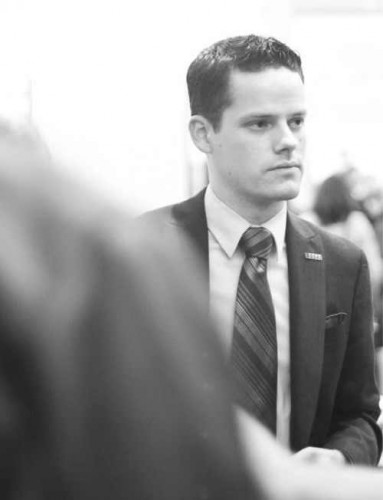 Well, I have a few disappointments of my own to share:
Well, I have a few disappointments of my own to share:
1. I am disappointed in bishops who have allowed financial interests to drive their response to the clerical sexual abuse crisis.
2. I am disappointed in a Church that has attempted to argue that same-sex couples and their families are somehow less able to live up to the Christian ideal than their heterosexual counterparts.
3. I am disappointed by a hierarchy that has attacked the dignity of women and LGBT people.
4. I am disappointed by a Church that feels it has the authority to silence academic voices like Sr. Elizabeth Johnston, Sr. Jeannine Grammick, or Fr. Robert Nugent.
5. I am disappointed by a Church that asserts free will and the supremacy of the conscience, but negates such teaching with a practical commandment to obedience and what it deems a “well-formed” conscience.
6. I am disappointed by a Church that has failed to meaningfully discern the inclusion of women in the diaconate or priesthood.
7. I am disappointed by the Church’s reliance on time. As we face progress, the Church has allowed its sluggish character to take hold of its conversations with the world.
8. I am disappointed by those who are afraid of the hierarchy.
9. I am disappointed by an institution that has used faith to bully public servants and has denied communion to those who have sought only to serve the common good.
10. I am disappointed by clergy who have used the pulpit as a means to proselytize a particular political agenda.
11. I am disappointed by the American bishops’ selfish claim of ownership of the principle of religious freedom.
In short, I am disappointed in the Church and its hierarchy. Standing in and looking around a Catholic Church, I not only feel as if I am no longer in my own home, but I also fail to recognize the Church itself. As a human being, I will not be a part of an institution that has allowed fear to drive its theology as is evident in nearly all of the issues that I cite above. For this reason, I have decided to leave the Catholic Church.
I am disappointed, frustrated, and saddened; yet amid my decision to leave the Roman Catholic Church, I am liberated. By this decision, I am following a conscience that leads me to believe that humanity has been created in the image of God. If we truly accept and believe this fundamental teaching, our world of judgment turns into a paradise of acceptance and compassion.
I am not leaving the Catholic Church because of any one particular issue or person, rather because I believe that the Church itself has lost sight of its meaning. A Church founded on hope and charity has become a tradition steeped in an approach that can best be described as “command and control.”
With this decision, some will argue that I should stay and continue efforts toward dialogue and the evolution of theology. On the other hand, some will say that I should have taken this step a long time ago, and still others will say “good riddance, so long.” The reality is that the journey of faith cannot be controlled by others, but rather is dependent only on one’s relationship with his/her Creator.
I now stand at new juncture in my faith journey. It is a place that can be described as both unfamiliar and yet eerily recognizable.
As I depart, I remain disappointed in the Roman Catholic Church and its hierarchy; however, I realize now that I am not joined by chains to the Church. In fact, it is the Church that taught me how to free myself from the bonds of oppression so as to constantly seek liberation. The question is when will the Church choose to loosen its own bonds so as to truly engage with the world around it?
Complete Article HERE!
Scalia’s Son Says Homosexuality Doesn’t Exist, Plans to Address Group that Encourages Lifelong Abstinence for Gays
File under: The apple doesn’t fall far from the tree. Two men with big fat homo issues. Poor dears!
By Brian Tashman
Courage, a Roman Catholic group that encourages gays and lesbians to live lifetimes of abstinence, is planning to hold its annual summit this month at the University of St. Mary of the Lake in Mundelein, Ill., which will include a speech by Fr. Paul Scalia.
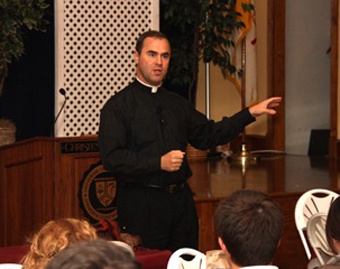 Paul Scalia is the son of Supreme Court Justice Antonin Scalia, and his involvement in Courage is well known.
Paul Scalia is the son of Supreme Court Justice Antonin Scalia, and his involvement in Courage is well known.
The conference’s website lists Scalia as “the Chairman of the Board of Directors of the Courage apostolate” and says he will speak on “Fearing the Lord … and Not Being Afraid.”
Courage also points to an article Scalia wrote for the Fall 2012 edition of Humanum: Issues in Family, Culture & Science, in which he reviews three books authored by Courage founder Fr. John Harvey.
Scalia’s piece claims that critics of homosexuality are being silenced and mistreated, while in “this radical transformation of society, one of the greatest casualties is the individual who experiences homosexual attractions but who desires to live chastity.” He adds that it is unfortunate that Harvey used the term “homosexual person” since according to Scalia, those people do not exist: “We should not predicate “homosexual” of any person. That does a disservice to the dignity of the human person by collapsing personhood into sexual inclinations.”
After hailing Harvey for having eventually “ceased using the term “homosexual” or “homosexual person,” Scalia goes on to claim that many people have “have found freedom, to varying degrees, from homosexual attractions” and deny that people have sexual orientations: “Homosexual tendencies (to use a term from magisterial documents), do not constitute a fixed, unchangeable aspect of the person and therefore should not be considered an “orientation”…. Either our sexuality is oriented in a certain direction (i.e. toward the one-flesh union of marriage), or it is not.”
Consider how swiftly American society has changed as regards homosexuality. The “Stonewall riots,” the touchstone and unofficial beginning of the gay rights movement, occurred in June 1969. Since then, the demands from the gay community have progressed from simple tolerance, to acceptance, to the right to marry, to now the silencing of any opposition as bigoted and “homophobic.” Those who once insisted on tolerance for their lifestyle will now tolerate no disagreement. Society now requires everyone’s approval of what not long ago was regarded as morally abhorrent.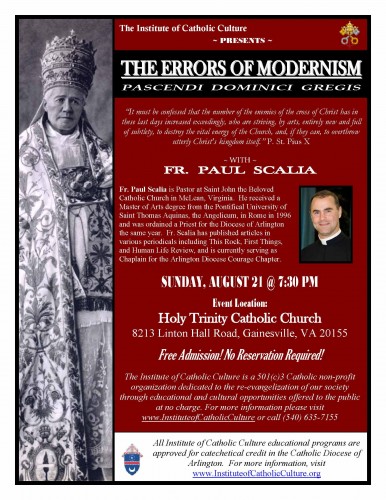
In this radical transformation of society, one of the greatest casualties is the individual who experiences homosexual attractions but who desires to live chastity. He finds, on one hand, the homosexual community encouraging him to live out his sexual desires, to claim his gay identity, to embrace the lifestyle, and so on. Worse, even some in the Church will encourage him to do so. Unfortunately, among those to whom he turns for help, he may find insensitivity, ignorance, misunderstanding, or simply an unwillingness to help. This individual is caught in the crossfire of the broader battle. He suffers great loneliness and often despair in the face of a struggle that some see as futile and others ignore.
…
In these books Father Harvey repeatedly articulates and explains the principle that guided his work and the work of Courage – namely, the distinction between the person and his homosexual attractions or tendencies. Those who advocate the goodness of homosexual acts and lifestyle do so because they identify the person – always a good – with the homosexual inclinations. They therefore conclude that such inclinations must be good and so also, of course, the actions. Likewise, those who feel shame and loneliness do so precisely because they have come to identify themselves (their very persons) with their same-sex attractions, which they know (both intellectually and affectively) to be wrong. The work of Courage (and of the Church as a whole) turns on the person/attraction distinction. We can fairly summarize that work as distinguishing the person to be loved from the attractions to be resisted and even overcome.
In this regard we must note the unfortunate title The Homosexual Person (and therefore also the unfortunate title of the CDF document). In short, we should not predicate “homosexual” of any person. That does a disservice to the dignity of the human person by collapsing personhood into sexual inclinations. The chronology of the books helps us to see the development in this area of language. Indeed, the Church is still trying to find the right vocabulary to speak about this modern phenomenon. Thus in his last book, Father Harvey ceased using the term “homosexual” or “homosexual person.” His thought and ministry brought him to realize that it is better to speak of someone with “same-sex attractions.” Although lacking brevity and ease of speech, this phrase has the virtue of precision. It acknowledges both the person/attraction distinction and the complexity of the condition – not fairly summarized as an “orientation.” Which brings us to another matter of vocabulary.…
Father Harvey’s use of the term “orientation” also underwent a deserved change. In his first two books we find the use of this word to describe homosexual inclinations or attractions. In the last book, however, he deliberately avoids it. This reflects the increased appreciation for the fact that homosexual tendencies (to use a term from magisterial documents), do not constitute a fixed, unchangeable aspect of the person and therefore should not be considered an “orientation.” Further, the term does violence to a proper understanding of human sexuality. Either our sexuality is oriented in a certain direction (i.e. toward the one-flesh union of marriage), or it is not. We cannot speak of more than one sexual “orientation” any more than we can think of the sun rising in more than one place (i.e. the orient).
Indeed, one of Father Harvey’s contributions is his discussion of the possibility for healing of homosexual attractions. He deftly navigates the extremes (on one hand, that change is impossible… on the other hand, that it is morally obligatory) to present the simple truth that many have found freedom, to varying degrees, from homosexual attractions. Thus we cannot speak of it as a fixed, unchangeable, unchanging “orientation.” (For this reason also the Church made a similar correction in the second edition of the Catechism, removing unfortunate language that implied homosexuality is a fixed orientation.)
Complete Article HERE!

